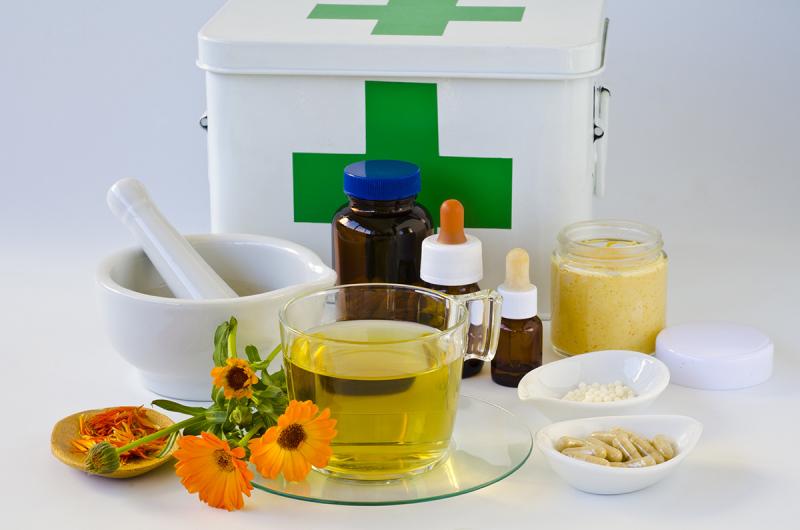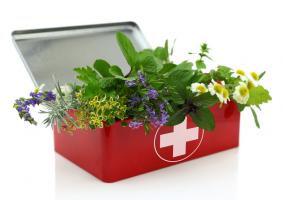
You’ve probably dealt with your fair share of cuts, bruises, abrasions, burns, sprains, insect bites, stings, and other minor injuries that need first aid. And, while modern medicine is necessary for serious injuries, most minor ones are easily treated at home with some basic knowledge of first aid and a few home remedies.
When it comes to home remedies for first aid, herbs and essential oils work better than most over-the-counter remedies. Natural remedies nourish and support tissues, reverse inflammation, and help injuries heal more quickly, usually without scarring. Even in serious injuries, natural remedies can help promote more rapid healing, making them great first aid remedies to keep in your home.
That’s why we’re covering first aid using herbs, essential oils, and other natural remedies in this issue of Sunshine Sharing. In this issue, you’ll find a list of remedies to keep on hand and a list of injuries and illnesses these remedies can be used to help. We’ll begin with the remedies you should keep in your first aid kit.
Assembling Your First Aid Kit
People don’t get sick or injured at convenient times. So, you can’t always run to the store when something happens. That’s why it’s wise to create a home first aid kit so that you have the tools on hand, ready to take care of injuries and illnesses as soon as they arise.
Your kit should include standard first aid supplies like an assortment of bandages, gauze pads, and other dressings for wounds, a pair of tweezers and a needle for extracting slivers, a small pair of scissors, and a flashlight for emergencies. In addition, we recommend you keep the following natural remedies on hand.
Herbal Remedies
There are many single herbs that are valuable as first aid remedies. Here are three of the most dependable and versatile single herbs keep on hand for first aid.
Aloe Vera: Aloe vera is a soothing, mucilaginous herb and one of the most dependable remedies for burns and sunburns. It is also helpful for abrasions, rashes, and irritated skin. Keep a high quality aloe vera gel in your kit or just keep an aloe vera plant in your home.
Capsicum Extract: Capsicum is an important remedy to stop bleeding, treat shock and stimulate circulation and healing. It is also a valuable remedy for colds and has mild analgesic qualities. The extract is best for first aid uses, but you may also wish to keep capsules too.
Lobelia Extract: Lobelia is an antispasmodic that relaxes muscle cramps or spasms and can be used to ease pain, reduce feelings of anxiety and stress, ease asthma attacks, and relieve tension headaches. Lobelia can also be used as an emetic to induce vomiting in cases of food poisoning or flu. The extract works best for first aid purposes.
Essential Oils
Essential oils are great additions to any first aid kit. What follows are a few oils you should consider having on hand.
An Analgesic EO Blend can be applied topically to ease the pain of headaches, muscle aches, arthritis, sore throats, and much more. It can also be inhaled to relieve respiratory congestion and promote mental alertness. It also makes a great remedy for insect bites and stings. It should contain essential oils like wintergreen, camphor, rosemary, and clove
Eucalyptus is one of the best remedies for respiratory congestion, it can be inhaled in steam, diffused, or smelled straight out of the bottle to ease coughing and congestion and to fight infection. It is an antiseptic and can be used topically much like tea tree oil (see below). It can be massaged into sore joints and muscles to ease pain.
Lavender helps with insomnia, stress, nervousness and nervous fatigue. It can be applied topically for burns, abrasions, bites and stings, fungal infections, and minor pains.
Peppermint is a great oil to settle the stomach and relieve gas and bloating, nausea, and the urge to vomit. It is also helpful for mental alertness when you’re tired; try putting a drop on the back of your tongue. It can also be applied topically to bites and stings.
Tea Tree is a great antiseptic oil to put on cuts, burns, scratches, wounds, and other injuries to prevent infection and aid healing. It can be rubbed on the throat to relieve sore throats and laryngitis. An alternative to tea tree oil is cajeput oil, which is a close relative with the same uses.
Other Remedies
Activated Charcoal: Every home should have some activated charcoal on hand for use in case of poisoning, especially if there are small children. It lasts forever, so there is no worry about it going bad. It is also good for intestinal gas, diarrhea, spider bites, and absorbing poisons that have been ingested.
Enzyme Spray: This product contains six classes of enzymes that break down organic chemicals that cause odors and stains. Besides these household uses, you can spray it on swollen and tender tissues to ease pain and promote healing. It’s specifically helpful for sunburn, insect bites and stings, and rashes and other skin irritations. It can also be used as an underarm deodorant.
Homeopathic Arnica: This is one of the best remedies to have on hand for injuries like sprains and bumps. It will reduce swelling, ease pain, and prevent bruising when taken internally or applied topically.
Nanoparticle Silver: An antiseptic is a must for a first aid kit and nanoparticle silver made with the aquasol technology is one of the best choices. It has been shown to kill every pathogenic microbe known. The liquid nanoparticle silver can be taken internally or applied topically. It can also be sprayed on the throat for sore throats, into the sinuses for sinus infections, or dropped in the ears for ear infections. The silver gel is an excellent hand sanitizer and topical antiseptic for any type of wound or sore.
Formulas
Immune Boosters: It’s good to have some remedies to stimulate the immune system to help your body resist colds, flu, and other infectious diseases when they are going around. Remedies that contain echinacea, mushrooms (reishi, cordyceps, maitake), vitamins C and D3, and zinc are helpful for reducing your risk of viral infections. You can keep some of these remedies as singles or as part of an Immune Boosting Formula.
Natural Pain Reliever: No first aid kit is complete without something for pain. An Anti-inflammatory Pain Formula containing herbs like andrographis, boswellia, mangosteen, turmeric or curcumin can be used to reduce inflammation and ease pain after injuries or surgery. Not only do these herbs reduce swelling and ease pain, they also help tissues heal faster. These herbs may also help with headaches, backaches, and other minor aches and pains.
Shock and Injury FE: This is a blend of the flower essences of star of Bethlehem, rock rose, impatiens, clematis, and cherry plum. It is helpful for easing both emotional and physical shock. It eases feelings of anxiety and anger and helps one be present and focused in emergencies. It can also be applied topically to speed the healing of minor injuries and burns.
Additional Resources
The Fundamentals of Natural Healing Course by Steven Horne (treelite.com)
Nature’s Home Remedies Course by Steven Horne and Jay Vanden Heuvel (naturesinstitute.com)
The Herbal Medic by Sam Coffman
Become a Member
Steven Horne's monthly member program is a way for you to get great information about herbs and natural healing to build your herbal business. Including the ability to share issues of Sunshine Sharing like this one. Click here to learn more.

